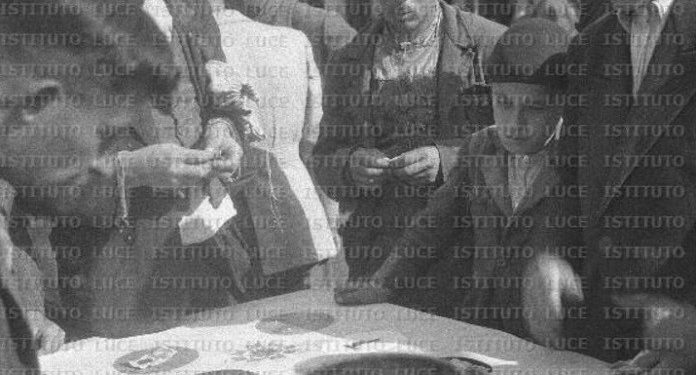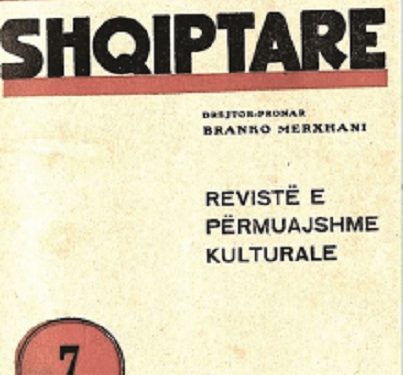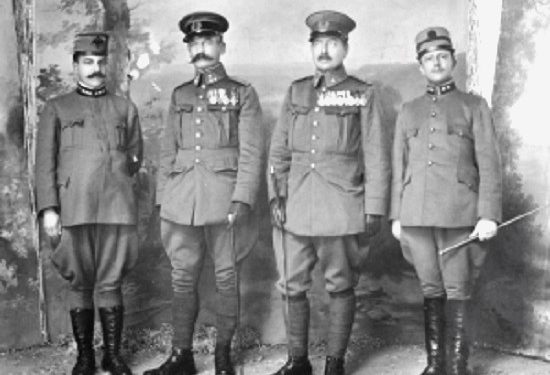By Kreshnik Kucaj
-The history of gambling in Albania, from 1927 until the vote by the Parliament, on October 25, 2018-
Memorie.al / Early attempts since 1914, to ban gambling in our country and attempts to monopolize it. The ban of 1927. The fear of the Albanian deputies about the American phenomenon of “prohibitionism” and the attitudes and discussions held in the plenary sessions of the time. Gambling has been considered a social scourge for Albanian society over the years. After the declaration of Independence, in 1912, it turns out that cafes were mainly the places where this activity took place, but there were not a few cases when powerful characters of that period turned their houses into “casinos”, which were very frequented. This problem was often highlighted in the press of the time, even Lumo Skëndo in his writings, considered cafes as; “nest of demoralization”.
And in this context, continuous efforts to curb this phenomenon in Albania have not been lacking. The efforts of those years have been in two directions; on the one hand, there have been attempts to ban gambling and, on the other hand, to bring it under control.
The first prohibition of gambling, in 1914
Among the first attempts to stop gambling in Albania, is that of 1914, by the Dutch military forces that were in the Albanian territory, for the maintenance of public order and the reorganization of the Albanian gendarmerie, within the framework of the international agreement that brought Prince Vidin to the direction of country. According to the journalistic reports of the time, gambling in this period had become a serious problem and so much gambling was played in cafes that it stayed up all night.
During this period, it turns out that gambling in public places was legally banned and, for this, the punishment was imprisonment. Although the order of the Dutch general, De Veer, who directed the military missions in the field, provided for the prohibition of gambling in public places and cafes, there are still no shortage of journalistic reports about the violation of this order. Such a case is reported in Vlora, on January 31, 1914, when the bartender of a well-known bar in the city of Vlora was caught, together with 4 other people, gambling. The persons appeared before the military court and were sentenced to one week in prison.
Attempted prohibition in 1927
Despite earlier attempts to ban it by law, gambling continued to be practiced in later years, but rather than stopping it, what was discussed in later years would be to bring under control the sale and purchase of gambling cards. In 1922, the establishment of a state monopoly on cards and matches would be approved, including in this law playing or gambling cards. Over the years, gambling and the tendency to play various games in cafes and other public places would turn into a serious problem, so much so that a concrete proposal would go to the parliament to ban all games, at least during working hours.
The proponent of the initiative would be MP Hiqmet Delvina, also known by the nickname “Bilbili i Zogut”. The draft law provided for two punishments; prison and fine. “Gambling for fun in cafes or in any public place is prohibited from sunrise to 5 p.m., except on official holidays. Gambling for entertainment is considered any game, such as; rum, taull, domino, kolčine, triumpho, consollit, preff, skambil and others that are not mentioned in this law. The offenders and patrons of the bars, as well as those who help them give you any kind of gambling equipment, are punished with imprisonment of 24 hours, up to one month, or with a fine of 100 to 1000 gold francs. In case of repetition, they are punished with both sentences together”, it was written in the draft law deposited in the parliament.
Statements made in a plenary session, in 1927
The proponent of the initiative, Hiqmet Delvina, who would later become the Minister of Justice, argues the need for such an initiative, as an urgent need, to solve the problem of leaving the workplace, not only by the population but also from the public administration.
“The project can be postponed, but my word is not. An Albanian saying says: ‘where the sin hurts, the tongue goes there’ and even those who say they don’t accept it, it seems that the sin hurts. I am doing this in the interest of the people, because I want to raise their morale and that time so that they can spend their time working in the fields, in trade and agriculture. This is what prompts me to make such a proposal, and if the criminal code includes this crime, then the law is not to blame, but those who do not implement it.
Throughout Albania and in the capital, all day long, people of all classes gather in unhygienic places and do nothing but play all kinds of games. The bulk of the land that is being freed from the land goes to waste, and in every village, in every country, this game is a disease worse than malaria and syphilis. As you know, the people must learn to work, that a people that does not work, that people does not have a good future and that without work, a country cannot live. These are the reasons why I am forced to submit this draft law to you and if you do not accept it, I will wash my hands of my duty, said Hiqmet Delvina, while the initiative proposed by him was discussed.
After giving the first argument by the proponent, there would be no shortage of alternative positions from other MPs, even from the Minister of Internal Affairs himself at that time. The concern expressed by the deputies is that what was happening with the ban on alcohol in the United States of America could happen in Albania. MP Javer Hurshidi from Gjirokastra supports the proposal, even though he notes that it contains some flaws that can be fixed, while the initiative will be examined concretely in the parliamentary committees. While Bahri Begolli, the deputy of Kosovo, highlights the fact that it is necessary to define a schedule, when it can be allowed to play, at least ordinary games.
Following the parliamentary debate:
Delvina: “His lordship has traveled Europe, he has also been to Vienna, and you should know that there, among many cafes, there is an hour designated for rest. In America, they don’t give him a chair when it’s work time. When the more civilized peoples do this, why don’t we do it too…”?!
Dibra, Minister of Internal Affairs: “Gambling is prohibited by law. With this project, even games that are for fun are banned, they would say that personal freedom is limited and as you know, the more something is limited, the more it is abused. If it is accepted, I ask you to take into account that the games in the coffeehouse will go around the streets and if you play with a coffee in the coffeehouse, you will play with money at home. Therefore, if it will be accepted, I am asking the commission to take this into consideration and make the ban a little easier”!
Delvina: “Mr. Minister of Internal Affairs says that personal freedom is limited. You did not expect this from his Lordship as a minister, as the minister of morals and education. Here, personal freedom is not limited and, until this freedom is limited to one’s self, he can have this right, but today in civilized States, even suicide is prohibited! This has nothing to do with the limitation of freedom, because those who gamble all day are thieves and, instead of working, steal and rob the rights of the state and children. Among those countries like America, where personal freedom is greater than among us, they have banned alcohol”
Kolë Mjeda: “I exactly agree with Mr. Hiqmet Delvina and accept it with some conditions, because we are afraid that if we ban the games in the cafes, we should not have our own odas where we work, the hall of the deputies, the gaming and gambling rooms. In America, drinking is prohibited, but you should know that there it costs millions and even though it is prohibited, it is still sold contraband. It is true that the games are very popular among the people and there have been cases where many have left their backs without bread with the games, but I had the same opinion, that we put a lot of taxes on the games and thus, they are removed by themselves.
If it is voted under these conditions, the games will be completely banned, it will not happen tomorrow that the functional deputies will gather in the streets with cards, then he accepted it, otherwise I am not of the opinion that we should cut the bread from those who carry coffee and live with this the master. I have been in Europe and I also know that in America, drinking is prohibited, but there people wear rubber bands full of brandy and japing, and they sell brandy as if it is given to children. So I am of the opinion that it should be postponed”
Rusi: “I have no doubt that my colleague is making this proposal with good intentions, so that the people’s enthusiasm for work increases, but he should know that this project does not fulfill his wishes, that a people does not he works, we stopped his entertainment, if he wants to work. If the games in the cafe are banned, he will be locked up with his friends for cheating, and it will be even worse. Therefore, I ask you to withdraw this proposal, even if it is not rejected by the Chamber, to go to the committee and stay there. If his Lordship had presented you with a proposal for the prohibition of alcohol, you would have accepted it with joy, but this project does not fulfill its purpose”!
After the above discussions, the session of November 1927 voted with a majority of votes, that the draft law be passed for discussion in the parliamentary committees and, in fact, it seems that after this step, there is no further advancement of the project. The steps taken are mainly for restrictions, as in the case of the 1931 law, which prohibited gambling and alcoholic beverages for those under the age of 18.
The attempt to monopolize gambling, in 1933
In one of the sessions held, in November 1933, a project-agreement was to be discussed, which was signed between the Minister of Finance and a merchant residing in Durrës, for the construction of a first-class hotel, with a capacity of 100 sleeping quarters, with all the necessary conditions, inside which there was a large casino, a ballroom, a bar, a theater and a cinema. The concession project was concluded between Mr. Kristaq Zagoridhi (merchant) and the Minister of Finance Abdurrahman Dibra. The project was ambitious and envisioned the construction of a resort similar to those in Monte Carlo or San Remo.
“The hotel in question will have a magnificent casino, with entertainment halls for balls, bars, theaters, cinemas and for various types, such as in Sanremo, Montecarlo, where the games of roulette, trent, carante, bacara, chemindefer, bulette and other games of chance, of this hand. The hotel will be decorated all around with flower gardens and orchards, which will have special places for tennis and other outdoor games, and next to the sea a modern bathhouse, with organizations for boating and other sports, which can attract foreigners and make Durrës beach a place of entertainment”!
This is what was written in the project-concession signed in October 1933 and, a month later, it was being discussed in the parliament hall in principle. The agreement stipulated that; the Albanian government to undertake to grant the concessionaire the exclusive right to practice gambling for a period of 33 years and not to grant any other concessions or permits for this purpose. “It is implied that the exclusive right belongs only to the exercise of various gambling games”, it was written in the project-concession, which was discussed in the parliament. The agreement was detailed and provided for, among other things, the staff that would be employed.
The waiters and croupiers of the casino would be hired as foreigners. On the gross annual revenue of the casino, the concessionaire was obliged to pay 10% of the revenue. The internal service in the casino and the gaming fee, would be set by means of a special regulation, which would also have the consent of the government. The project-concession would be accepted in principle in the plenary session and would be referred to the parliamentary committees, but no further progress would be made in this direction.
Prohibition of 1937 and its non-enforcement
In 1937, the Prime Minister would appreciate the initiative of the Ministry of the Interior, for the complete prohibition of gambling for the population and employees. And under these conditions, the Albanian Prime Minister would send a circular to all important ministries and directorates, including the Directorate of Agrarian Reform, with which he demanded that a definite order be given to all the officials who had , so that they would not gamble anymore, since they were caught gambling, they would be investigated, brought before the court and punished as the law provides. This measure, although it would be positively evaluated by the press of the time, would be considered insufficient.
In the issue of April 1937, in Branko Merxhani’s “Effort”, concern is expressed that the initiative of the Ministry of the Interior, for this purpose; “lost in the columns of notebook chronicles”! “The Ministry of the Interior has been dealing with the social problems of the country for some time, and even in a very careful way. One of these problems is gambling, for which the ministry issued a strict prohibition measure, to take notice. But, unfortunately, this wise decision does not catch our eye as much as it should. It almost went unnoticed and got lost in the columns of notebook chronicles. The relevant circular of the ministry, in reality, affects an important social disease, a disease which in recent times had started to show dangerous symptoms.
And at the same time, he tells us the way of healing that the government found, for the disappearance of this wound. We do not know whether the diagnosis was made correctly or not and whether the therapy that was prescribed is exactly what was deserved. But one thing is indisputable: the government’s interest in suffocating the germ of gambling, which began to grow and contaminate the blood of our society. Gambling almost becomes the only means of entertainment. It entered school classrooms. A teacher told us one day, with a painful pain, how he caught two of his students playing gambling in the last banks of the class, right during the lessons”, it is written in the article of Merxhan’s “Effort”.
Further in the article, it is evident that the effect of administrative measures is small and that negative disciplines do not extinguish moral vices, but only cover them, but do not eradicate them. “Even banning gambling everywhere is not a reasonable measure. In some designated and well-controlled places, gambling should be allowed freely, especially in some public centers. Prohibition may bring about the closure of these centers, whose usefulness is not small, but the complete cure of this disease must be found in the wider moral fields. To create ideals, emotions, occupations that inspire deep taste, as well as causes of higher amusements and joys.
Let’s get closer to the sources of real human life, which can only be obtained around the mental work table and which is inspired by pure passions that art creates”, concludes the article. During the occupation period against gambling, it turns out that no punitive measures were taken and that the activity was exercised freely, even in the center of the capital, in an open and public environment, as shown in the following photo of the LUCE institute from 1943, realized in the center of Tirana. During the communist regime, gambling was strictly prohibited, but again there was no lack of illegal betting or other games, which in the cases that have been recorded, have brought long-term imprisonment on this charge. Memorie.al















